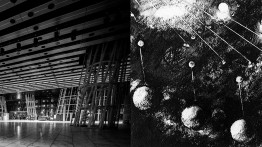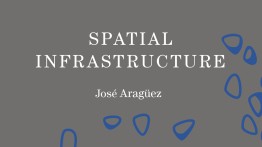Book Launch | José Aragüez: Spatial Infrastructure
Tuesday, January 24, 2023, 6:30 - 8:30pm
This lecture will be conducted in-person in The Cooper Union Library and through Zoom.
For Zoom attendance, please register in advance here.
For In-Person attendance, please register in advance here.
After The Building, José Aragüez's second book revolves around a new concept in architecture, spatial infrastructure, that operates both as a design tool capable of projecting architectural thinking forward, and as an analytical category that shifts our understanding of the history of the field and contemporary production.
Taken together, the collection of essays presented by Aragüez investigates some of the most intractable issues pertaining to architectural discourse, while also examining scientific, critical, and cultural dimensions where relevant. Key subjects include a building’s discursive building, engineering patents and spatial disposition in architecture, typological invention and sponge surfaces, “the organic” at the intersection of architecture and philosophy, imageability in the context of an evolving market economy, language vis-à-vis self-determinacy in creative practices, a building’s spatial kernel, and the possibility of architectural metacriticality.
Aragüez’ presentation will be joined in conversation by Catherine Ingraham and Nader Tehrani. The discussion will be moderated by Elisa Iturbe.
José Aragüez is a licensed practicing architect, writer, and educator based in Paris and New York. He teaches at Yale University, having previously led graduate studios and seminars at Columbia GSAPP from 2013–20, and having held the 2020–21 H. Deane Pearce Endowed Chair at Texas Tech. Aragüez obtained a PhD in the History and Theory of Architecture from Princeton University. Earlier he graduated with a Master of Architecture and Urbanism from the University of Granada, Spain (Honorable Mention, University Graduation Extraordinary Award, and 1st National Prize in Architecture) and, from Columbia GSAPP, with a post-professional Master’s degree (Honor Award for Excellence in Design) and a Graduate Certificate in Advanced Architectural Research. Aragüez has lectured extensively across Europe and North America—including most of the top schools—in addition to the Middle East and Japan. Besides Columbia and Texas Tech, he has taught at Cornell, Princeton, Penn, Rice University in Paris, and the University of Granada. His recent five-year project, involving the publication of The Building (2016, Lars Müller Pub.), is widely regarded in international circles as one of the most significant contributions to architectural discourse in the 2010s. His writings have also appeared in e-flux, Flat Out, EAHN Proceedings, Pidgin, The Routledge Companion to Criticality in Art, Architecture and Design (Routledge, 2018), Radical Pedagogies (MIT Press, 2022), and TECNOSCAPE: The Architecture of Engineers (Fondazione MAXXI, 2022). His second book, titled Spatial Infrastructure, has been published by Actar in fall 2022. Aragüez is the founding principal of José Aragüez Architects, a practice for architecture, urbanism, and the production of discourse. In the past, he worked as an architect for Antonio J. Torrecillas (Spain), MVRDV (Rotterdam), and Idom/ACXT (London).
Catherine Ingraham: Chair of Graduate Architecture, Pratt Institute 1999-2005. Editor, Assemblage, 1991-98. Author, Architecture, Animal, Human (Routledge Press, 2006) and Architecture and the Burdens of Linearity (Yale University Press, 1998). Recipient, New York State Council on the Arts grant 2007; Canadian Center for Architecture research fellowship, 2005; Graham Foundation grants 1987 and 2005; NEA grant 1992; SOM research fellowship, Chicago, 1988-90; MacDowell Colony residencies (4) 2001-2007. Winner, with Laurie Hawkinson, of design competition for Museum of Women’s History, Battery Park City, New York 2001. Author of over fifty articles on architectural theory and history published in academic journals, book collections and other publications. Invited lectures, seminars, symposia at over sixty national and international universities. Visiting Professor, Graduate School of Design, Harvard University 1991 and 1993; Graduate School of Architecture, Columbia University 1989 and 1990. Editor, with Marco Diani, of Restructuring Architectural Theory (Northwestern University Press, 1988)
Nader Tehrani is a Professor at The Irwin S. Chanin School of Architecture of The Cooper Union where he also served as Dean from 2015-22. He was professor of architecture at MIT, where he served as the Head of the Department from 2010-2014. He is also Principal of NADAAA, a practice dedicated to the advancement of design innovation, interdisciplinary collaboration, and an intensive dialogue with the construction industry.
For his contributions to architecture as an art, Nader Tehrani is the recipient of the 2020 Arnold W. Brunner Memorial Prize from The American Academy of Arts and Letters, to which he was also elected as a Member in 2021, the highest form of recognition of artistic merit in The United States.
Elisa Iturbe is Assistant Professor at the Cooper Union. Her research is currently focused on the relationship between energy, power, and form and her writings have been published in AA Files, Log, Perspecta, Antagonismos, New York Review of Architecture, and more. Iturbe is also co-founder of Outside Development, a design and research practice.
Located at 7 East 7th Street, between Third and Fourth Avenues






